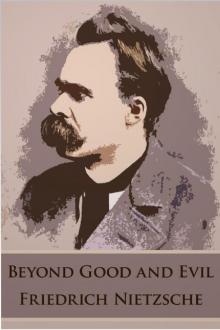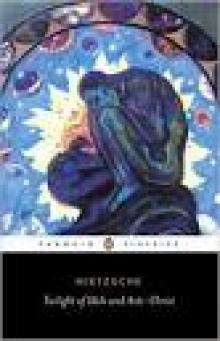- Home
- Friedrich Nietzsche
The Portable Nietzsche Page 14
The Portable Nietzsche Read online
Page 14
Once you suffered passions and called them evil. But now you have only your virtues left: they grew out of your passions. You commended your highest goal to the heart of these passions: then they become your virtues and passions you enjoyed.
And whether you came from the tribe of the choleric or of the voluptuous or of the fanatic or of the vengeful, in the end all your passions became virtues and all your devils, angels. Once you had wild dogs in your cellar, but in the end they turned into birds and lovely singers. Out of your poisons you brewed your balsam. You milked your cow, melancholy; now you drink the sweet milk of her udder.
And nothing evil grows out of you henceforth, unless it be the evil that grows out of the fight among your virtues. My brother, if you are fortunate you have only one virtue and no more: then you will pass over the bridge more easily. It is a distinction to have many virtues, but a hard lot; and many have gone into the desert and taken their lives because they had wearied of being the battle and battlefield of virtues.
My brother, are war and battle evil? But this evil is necessary; necessary are the envy and mistrust and calumny among your virtues. Behold how each of your virtues covets what is highest: each wants your whole spirit that it might become her herald; each wants your whole strength in wrath, hatred, and love. Each virtue is jealous of the others, and jealousy is a terrible thing. Virtues too can perish of jealousy. Surrounded by the flame of jealousy, one will in the end, like the scorpion, turn one’s poisonous sting against oneself. Alas, my brother, have you never yet seen a virtue deny and stab herself?
Man is something that must be overcome; and therefore you shall love your virtues, for you will perish of them.
Thus spoke Zarathustra.
ON THE PALE CRIMINAL
You do not want to kill, O judges and sacrificers, until the animal has nodded? Behold, the pale criminal has nodded: out of his eyes speaks the great contempt.
“My ego is something that shall be overcome: my ego is to me the great contempt of man,” that is what his eyes say.
That he judged himself, that was his highest moment; do not let the sublime return to his baseness! There is no redemption for one who suffers so of himself, except a quick death.
Your killing, O judges, shall be pity and not revenge. And as you kill, be sure that you yourselves justify lifel It is not enough to make your peace with the man you kill. Your sadness shall be love of the overman: thus you shall justify your living on.
“Enemy” you shall say, but not “villain”; “sick” you shall say, but not “scoundrel”; “fool” you shall say, but not “sinner.”
And you, red judge, if you were to tell out loud all that you have already done in thought, everyone would cry, “Away with this filth and this poisonous worm!”
But thought is one thing, the deed is another, and the image of the deed still another: the wheel of causality does not roll between them.
An image made this pale man pale. He was equal to his deed when he did it; but he could not bear its image after it was done. Now he always saw himself as the doer of one deed. Madness I call this: the exception now became the essence for him. A chalk streak stops a hen; the stroke that he himself struck stopped his poor reason: madness after the deed I call this.
Listen, O judges: there is yet another madness, and that comes before the deed. Alas, you have not yet crept deep enough into this soul.
Thus speaks the red judge, “Why did this criminal murder? He wanted to rob.” But I say unto you: his soul wanted blood, not robbery; he thirsted after the bliss of the knife. His poor reason, however, did not comprehend this madness and persuaded him: “What matters blood?” it asked; “don’t you want at least to commit a robbery with it? To take revenge?” And he listened to his poor reason: its speech lay upon him like lead; so he robbed when he murdered. He did not want to be ashamed of his madness.
And now the lead of his guilt lies upon him, and again his poor reason is so stiff, so paralyzed, so heavy. If only he could shake his head, then his burden would roll off: but who could shake this head?
What is this man? A heap of diseases, which, through his spirit, reach out into the world: there they want to catch their prey.
What is this man? A ball of wild snakes, which rarely enjoy rest from each other: so they go forth singly and seek prey in the world.
Behold this poor body! What it suffered and coveted this poor soul interpreted for itself: it interpreted it as murderous lust and greed for the bliss of the knife.
Those who become sick today are overcome by that evil which is evil today: they want to hurt with that which hurts them. But there have been other ages and another evil and good. Once doubt was evil and the will to self. Then the sick became heretics or witches: as heretics or witches they suffered and wanted to inflict suffering.
But your ears do not want to accept this: it harms your good people, you say to me. But what matter your good people to me? Much about your good people nauseates me; and verily, it is not their evil. Indeed, I wish they had a madness of which they might perish like this pale criminal.
Verily, I wish their madness were called truth or loyalty or justice: but they have their virtue in order to live long and in wretched contentment.
I am a railing by the torrent: let those who can, grasp me! Your crutch, however, I am not.
Thus spoke Zarathustra.
ON READING AND WRITING
Of all that is written I love only what a man has written with his blood. Write with blood, and you will experience that blood is spirit.
It is not easily possible to understand the blood of another: I hate reading idlers. Whoever knows the reader will henceforth do nothing for the reader. Another century of readers—and the spirit itself will stink.
That everyone may learn to read, in the long run corrupts not only writing but also thinking. Once the spirit was God, then he became man, and now he even becomes rabble.
Whoever writes in blood and aphorisms does not want to be read but to be learned by heart. In the mountains the shortest way is from peak to peak: but for that one must have long legs. Aphorisms should be peaks—and those who are addressed, tall and lofty. The air thin and pure, danger near, and the spirit full of gay sarcasm: these go well together. I want to have goblins around me, for I am courageous. Courage that puts ghosts to flight creates goblins for itself: courage wants to laugh.
I no longer feel as you do: this cloud which I see beneath me, this blackness and gravity at which I laugh—this is your thundercloud.
You look up when you feel the need for elevation. And I look down because I am elevated. Who among you can laugh and be elevated at the same time? Whoever climbs the highest mountains laughs at all tragic plays and tragic seriousness.
Brave, unconcerned, mocking, violent—thus wisdom wants us: she is a woman and always loves only a warrior.
You say to me, “Life is hard to bear.” But why would you have your pride in the morning and your resignation in the evening? Life is hard to bear; but do not act so tenderly! We are all of us fair beasts of burden, male and female asses. What do we have in common with the rosebud, which trembles because a drop of dew lies on it?
True, we love life, not because we are used to living but because we are used to loving. There is always some madness in love. But there is also always some reason in madness.
And to me too, as I am well disposed toward life, butterflies and soap bubbles and whatever among men is of their kind seem to know most about happiness. Seeing these light, foolish, delicate, mobile little souls flutter—that seduces Zarathustra to tears and songs.
I would believe only in a god who could dance. And when I saw my devil I found him serious, thorough, profound, and solemn: it was the spirit of gravity—through him all things fall.
Not by wrath does one kill but by laughter. Come, let us kill the spirit of gravity!
I have learned to walk: ever since, I let myself run. I have learned to fly: ever since, I do not want to be pushed before mo
ving along.
Now I am light, now I fly, now I see myself beneath myself, now a god dances through me.
Thus spoke Zarathustra.
ON THE TREE ON THE MOUNTAINSIDE
Zarathustra’s eye had noted that a youth avoided him. And one evening as he walked alone through the mountains surrounding the town which is called The Motley Cow—behold, on his walk he found this youth as he sat leaning against a tree, looking wearily into the valley. Zarathustra gripped the tree under which the youth was sitting and spoke thus:
“If I wanted to shake this tree with my hands I should not be able to do it. But the wind, which we do not see, tortures and bends it in whatever direction it pleases. It is by invisible hands that we are bent and tortured worst.”
Then the youth got up in consternation and said: “I hear Zarathustra, and just now I was thinking of him.”
Zarathustra replied: “Why should that frighten you? But it is with man as it is with the tree. The more he aspires to the height and light, the more strongly do his roots strive earthward, downward, into the dark, the deep—into evil.”
“Yes, into evil!” cried the youth. “How is it possible that you discovered my soul?”
Zarathustra smiled and said: “Some souls one will never discover, unless one invents them first.”
“Yes, into evil!” the youth cried once more. “You have spoken the truth, Zarathustra. I no longer trust myself since I aspire to the height, and nobody trusts me any more; how did this happen? I change too fast: my today refutes my yesterday. I often skip steps when I climb: no step forgives me that. When I am at the top I always find myself alone. Nobody speaks to me; the frost of loneliness makes me shiver. What do I want up high? My contempt and my longing grow at the same time; the higher I climb, the more I despise the climber. What does he want up high? How ashamed I am of my climbing and stumbling! How I mock at my violent panting! How I hate the flier! How weary I am up high!”
Here the youth stopped. And Zarathustra contemplated the tree beside which they stood and spoke thus: “This tree stands lonely here in the mountains; it grew high above man and beast. And if it wanted to speak it would have nobody who could understand it, so high has it grown. Now it waits and waits—for what is it waiting? It dwells too near the seat of the clouds: surely, it waits for the first lightning.”
When Zarathustra had said this the youth cried with violent gestures: “Yes, Zarathustra, you are speaking the truth. I longed to go under when I aspired to the height, and you are the lightning for which I waited. Behold, what am I, now that you have appeared among us? It is the envy of you that has destroyed me.” Thus spoke the youth, and he wept bitterly. But Zarathustra put his arm around him and led him away.
And when they had walked together for a while, Zarathustra began to speak thus: “It tears my heart. Better than your words tell it, your eyes tell me of all your dangers. You are not yet free, you still search for freedom. You are worn from your search and overawake. You aspire to the free heights, your soul thirsts for the stars. But your wicked instincts, too, thirst for freedom. Your wild dogs want freedom; they bark with joy in their cellar when your spirit plans to open all prisons. To me you are still a prisoner who is plotting his freedom: alas, in such prisoners the soul becomes clever, but also deceitful and bad. And seven the liberated spirit must still purify himself. Much prison and mustiness still remain in him: his eyes must still become pure.
“Indeed, I know your danger. But by my love and hope I beseech you: do not throw away your love and hope.
“You still feel noble, and the others too feel your nobility, though they bear you a grudge and send you evil glances. Know that the noble man stands in everybody’s way. The noble man stands in the way of the good too: and even if they call him one of the good, they thus want to do away with him. The noble man wants to create something new and a new virtue. The good want the old, and that the old be preserved. But this is not the danger of the noble man, that he might become one of the good, but a churl, a mocker, a destroyer.
“Alas, I knew noble men who lost their highest hope. Then they slandered all high hopes. Then they lived impudently in brief pleasures and barely cast their goals beyond the day. Spirit too is lust, so they said. Then the wings of their spirit broke: and now their spirit crawls about and soils what it gnaws. Once they thought of becoming heroes: now they are voluptuaries. The hero is for them an offense and a fright.
“But by my love and hope I beseech you: do not throw away the hero in your soul! Hold holy your highest hope!”
Thus spoke Zarathustra.
ON THE PREACHERS OF DEATH
There are preachers of death; and the earth is full of those to whom one must preach renunciation of life. The earth is full of the superfluous; life is spoiled by the all-too-many. May they be lured from this life with the “eternal life”! Yellow the preachers of death wear, or black. But I want to show them to you in still other colors.
There are the terrible ones who carry around within themselves the beast of prey and have no choice but lust or self-laceration. And even their lust is still self-laceration. They have not even become human beings yet, these terrible ones: let them preach renunciation of life and pass away themselves!
There are those with consumption of the soul: hardly are they born when they begin to die and to long for doctrines of weariness and renunciation. They would like to be dead, and we should welcome their wish. Let us beware of waking the dead and disturbing these living coffins!
They encounter a sick man or an old man or a corpse, and immediately they say, “Life is refuted.” But only they themselves are refuted, and their eyes, which see only this one face of existence. Shrouded in thick melancholy and eager for the little accidents that bring death, thus they wait with clenched teeth. Or they reach for sweets while mocking their own childishness; they clutch the straw of their life and mock that they still clutch a straw. Their wisdom says, “A fool who stays alive—but such fools are we. And this is surely the most foolish thing about life.”
“Life is only suffering,” others say, and do not lie: see to it, then, that you cease! See to it, then, that the life which is only suffering ceases!
And let this be the doctrine of your virtue: “Thou shalt kill thyself! Thou shalt steal away!”
“Lust is sin,” says one group that preaches death; “let us step aside and beget no children.”
“Giving birth is troublesome,” says another group; “why go on giving birth? One bears only unfortunates!”
And they too are preachers of death.
“Pity is needed,” says the third group. “Take from me what I have! Take from me what I am! Life will bind me that much less!”
If they were full of pity through and through, they would make life insufferable for their neighbors. To be evil, that would be their real goodness. But they want to get out of life: what do they care that with their chains and presents they bind others still more tightly?
And you, too, for whom life is furious work and unrest—are you not very weary of life? Are you not very ripe for the preaching of death? All of you to whom furious work is dear, and whatever is fast, new, and strange—you find it hard to bear yourselves; your industry is escape and the will to forget yourselves. If you believed more in life you would fling yourselves less to the moment. But you do not have contents enough in yourselves for waiting—and not even for idleness.
Everywhere the voice of those who preach death is heard; and the earth is full of those to whom one must preach death. Or “eternal life”—that is the same to me, if only they pass away quickly.
Thus spoke Zarathustra.
ON WAR AND WARRIORS
We do not want to be spared by our best enemies, nor by those whom we love thoroughly. So let me tell you the truth!
My brothers in war, I love you thoroughly; I am and I was of your kind. And I am also your best enemy. So let me tell you the truth!
I know of the hatred and envy of your hearts. You are not gre
at enough not to know hatred and envy. Be great enough, then, not to be ashamed of them.
And if you cannot be saints of knowledge, at least be its warriors. They are the companions and forerunners of such sainthood.
I see many soldiers: would that I saw many warriors! “Uniform” one calls what they wear: would that what it conceals were not uniform!
You should have eyes that always seek an enemy—your enemy. And some of you hate at first sight. Your enemy you shall seek, your war you shall wage—for your thoughts. And if your thought be vanquished, then your honesty should still find cause for triumph in that. You should love peace as a means to new wars—and the short peace more than the long. To you I do not recommend work but struggle. To you I do not recommend peace but victory. Let your work be a struggle. Let your peace be a victory! One can be silent and sit still only when one has bow and arrow: else one chatters and quarrels. Let your peace be a victory!
You say it is the good cause that hallows even war? I say unto you: it is the good war that hallows any cause. War and courage have accomplished more great things than love of the neighbor. Not your pity but your courage has so far saved the unfortunate.
“What is good?” you ask. To be brave is good. Let the little girls say, “To be good is what is at the same time pretty and touching.”
They call you heartless: but you have a heart, and I love you for being ashamed to show it. You are ashamed of your flood, while others are ashamed of their ebb.
You are ugly? Well then, my brothers, wrap the sublime around you, the cloak of the ugly. And when your soul becomes great, then it becomes prankish; and in your sublimity there is sarcasm. I know you.
In sarcasm the prankster and the weakling meet. But they misunderstand each other. I know you.

 The Portable Nietzsche
The Portable Nietzsche Twilight of the Idols/The Anti-Christ
Twilight of the Idols/The Anti-Christ Thus Spoke Zarathustra
Thus Spoke Zarathustra Why I Am So Clever
Why I Am So Clever Beyond Good and Evil
Beyond Good and Evil Twilight of Idols and Anti-Christ
Twilight of Idols and Anti-Christ Twilight of Idols and Anti-Christ (Penguin Classics)
Twilight of Idols and Anti-Christ (Penguin Classics)